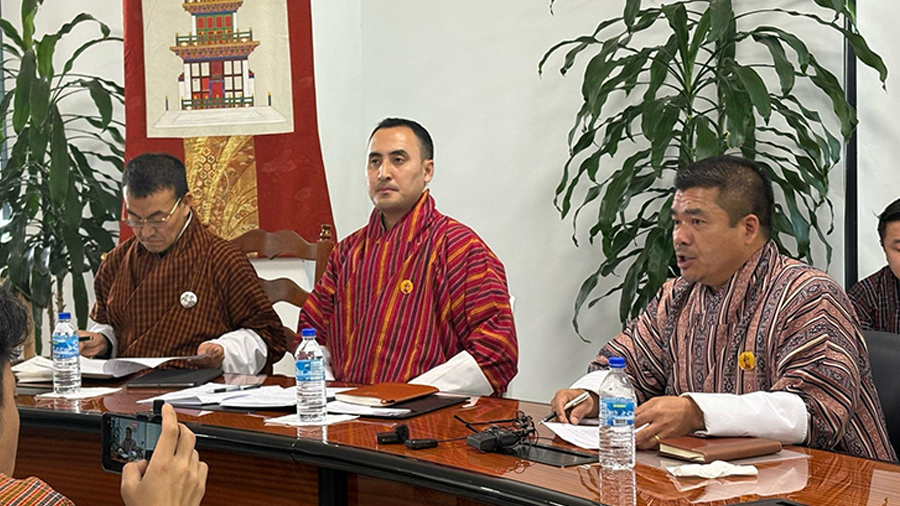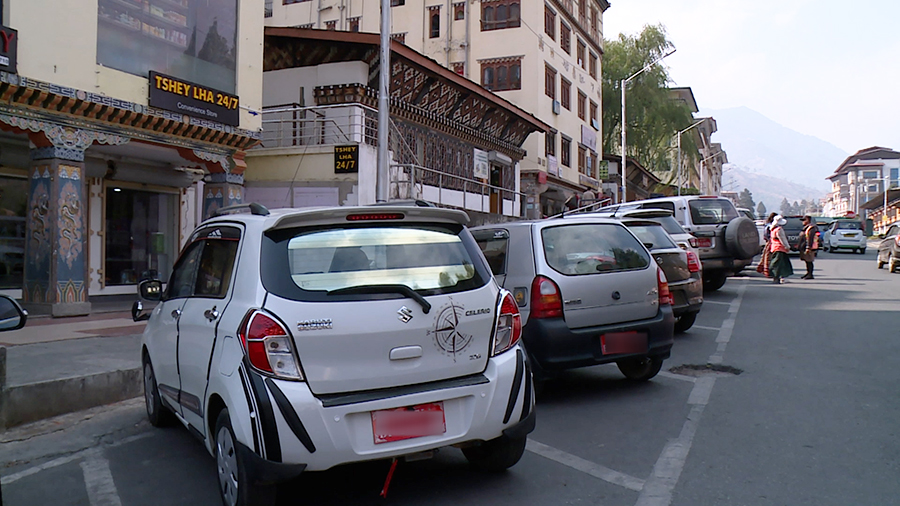 The Thimphu Thromde has submitted a budget proposal to the finance ministry for an automated parking fee collection system in the capital. The infrastructure and transport minister disclosed this during yesterday’s Meet the Press session. He was responding to a media query on whether the government plans to introduce a system similar to the one recently implemented in Phuentshogling.
The Thimphu Thromde has submitted a budget proposal to the finance ministry for an automated parking fee collection system in the capital. The infrastructure and transport minister disclosed this during yesterday’s Meet the Press session. He was responding to a media query on whether the government plans to introduce a system similar to the one recently implemented in Phuentshogling.
At parking zones across Thimphu, fee collectors say the lack of a digital system makes their job difficult. They say some vehicle owners leave without paying, while others question the charges, leading to frequent disputes.
 47-year-old Deoraj Rai has been working as a parking fee collector in Thimphu since last year. He says he has only received his full salary on a few occasions. This is because he struggles to meet his daily quota of Nu 5,000 in parking fees, which they need to contribute to their contractor. He says some car owners either leave without paying or dispute the charges. The shortfall is deducted from his salary.
47-year-old Deoraj Rai has been working as a parking fee collector in Thimphu since last year. He says he has only received his full salary on a few occasions. This is because he struggles to meet his daily quota of Nu 5,000 in parking fees, which they need to contribute to their contractor. He says some car owners either leave without paying or dispute the charges. The shortfall is deducted from his salary.
Deoraj Rai said, “There are car owners who park from 9 in the morning until 10 at night and often do not return to take their cars. This results in a loss for me, as I am unable to collect fees. Even when we try reaching them with the help of the traffic police, their phones are usually switched off. Moreover, their cars occupy the parking space all day, preventing others from parking and further hindering our ability to meet the daily quota.”
Like Deoraj, a 22-year-old parking fee collector, shared her experience of encountering reluctant and rude car owners. She said some drivers resist paying the fees and frequently become confrontational, which makes her job more difficult.
She said, “Some car owners throw the parking fees in frustration, while others argue that the charges are unfair and try to negotiate. In such cases, we struggle to meet our daily quota, and the shortfall is recorded as dues. This directly affects our salaries, sometimes reducing them or leaving us with no pay at all due to the unpaid dues from unmet quotas.”
The story is the same for all the parking fee collectors.
“I think it would be highly beneficial to introduce a mobile parking app here, similar to the one in Phuentsholing. When we fail to meet the daily quota, our contractors assume we have taken the money. With such a system in place, the fees would be calculated automatically, eliminating misunderstandings,” said another parking fee collector, Jigme Zangpo.
The infrastructure and transport minister, Chandra Bdr. Gurung said that the Thromde authority acknowledges the issues the parking fee collectors are facing. He emphasised the government’s support in easing the hassle through digital means.
He said, “The thromde office has submitted a budget proposal to the finance ministry for an automated parking fee collection system, and the ministry has shown support for the initiative. The thromde is currently working on this. As a government, we should support such innovations, as they will help ease traffic congestion.”
The Phuentshogling Thromde introduced “Parking.bt”—a QR-based mobile parking application about a month ago. Drivers can register to generate a unique code, which parking fee collectors will scan when a vehicle is parked. The system then calculates the fee automatically, ensuring transparency and accountability. It is not known if the system is effective as it has been recently introduced.
On the other hand, vehicle owners express frustration with the current fee system, which charges a flat rate of Nu 20 as soon as a car is parked, regardless of whether it stays for a few minutes or up to 30 minutes. Moreover, they are also skeptical about fee collectors overcharging.
 With the growing number of vehicles in Thimphu, people express the need for a digital parking fee system, which could help streamline traffic, simplify payments, and make the relationship between fee collectors and payers harmonious.
With the growing number of vehicles in Thimphu, people express the need for a digital parking fee system, which could help streamline traffic, simplify payments, and make the relationship between fee collectors and payers harmonious.
Tashi Dekar
Edited by Kipchu








